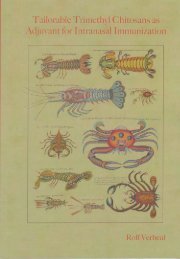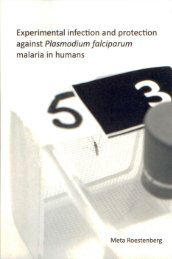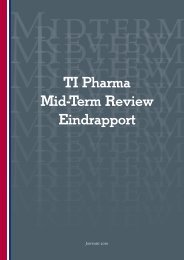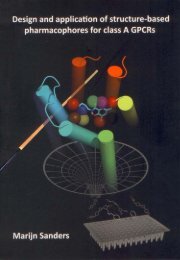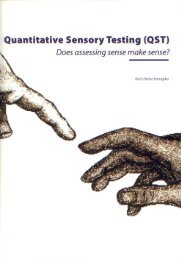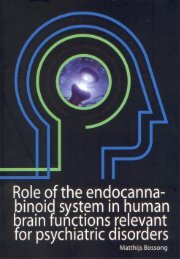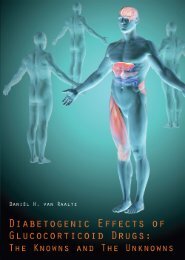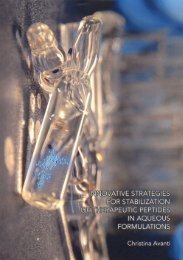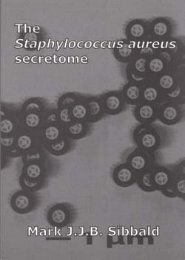The vagus nerve as a modulator of intestinal inflammation - TI Pharma
The vagus nerve as a modulator of intestinal inflammation - TI Pharma
The vagus nerve as a modulator of intestinal inflammation - TI Pharma
Create successful ePaper yourself
Turn your PDF publications into a flip-book with our unique Google optimized e-Paper software.
INTRODUC<strong>TI</strong>ON<br />
Vagal activity enhances macrophage phagocytosis<br />
In the g<strong>as</strong>tro-<strong>intestinal</strong> tract, the <strong>vagus</strong> <strong>nerve</strong> regulates motility and digestive<br />
functions mostly via the peripheral rele<strong>as</strong>e <strong>of</strong> the par<strong>as</strong>ympathetic neurotransmitter<br />
acetylcholine (ACh) that activates nicotinic acetylcholine receptors (nAChRs).<br />
However, vagal activity h<strong>as</strong> also immune-regulatory properties. While the afferent<br />
<strong>vagus</strong> system is known to regulate the inflammatory response via the hypothalamic<br />
pituitary adrenal axis, efferent <strong>vagus</strong> <strong>nerve</strong> activity possesses immuno-<strong>modulator</strong>y<br />
potential <strong>as</strong> well. Borovikova et al 1 have revealed the potency <strong>of</strong> the <strong>vagus</strong> <strong>nerve</strong><br />
to inhibit TNF production by macrophages after systemic endotoxin 2 . Peritoneal<br />
and PBMC-derived macrophages express nAChRs, and nAChR activation h<strong>as</strong> been<br />
shown to inhibit NF-κB transcriptional activity 3,4 and pro-inflammatory cytokine<br />
production 4,5 . In conjunction, electrical <strong>vagus</strong> <strong>nerve</strong> stimulation h<strong>as</strong> been shown<br />
to ameliorate dise<strong>as</strong>e in animal models <strong>of</strong> inflammatory conditions such <strong>as</strong> postoperative<br />
ileus 4,6 , colitis 7 , peritonitis 8,9 , and hemorrage 10 . An immune regulating<br />
role for the cholinergic nervous system may be particularly evident in <strong>intestinal</strong><br />
tissue, given the dense cholinergic innervation, and the abundant number <strong>of</strong> resident<br />
macrophages that populate the <strong>intestinal</strong> mucosa and muscularis externa, <strong>of</strong> which<br />
some closely <strong>as</strong>sociate with cholinergic fibers 6 .<br />
Cholinergic inhibition <strong>of</strong> pro-inflammatory cytokine production by macrophages<br />
h<strong>as</strong> been firmly established 1,3,6 . However, besides an effect on cytokine secretion, the<br />
cholinergic nervous system may also affect more pr<strong>of</strong>essional macrophage functions<br />
such <strong>as</strong> endo- and phagocytosis <strong>of</strong> bacteria and particles. Especially in the <strong>intestinal</strong><br />
compartment macrophages may rather function <strong>as</strong> phagocytes that, along with<br />
dendritic cells, form critical effectors in the surveillance <strong>of</strong> luminal antigens 11,12 .<br />
Hence, the question arises whether the anti-inflammatory effect <strong>of</strong> <strong>vagus</strong> <strong>nerve</strong> activity<br />
in <strong>intestinal</strong> <strong>inflammation</strong> solely rests on reduced macrophage cytokine production,<br />
or whether the <strong>vagus</strong> <strong>nerve</strong> also regulates other macrophage functions important in<br />
host defense. This is supported by the observation that <strong>vagus</strong> <strong>nerve</strong> activity affects<br />
bacterial clearance and mortality in various mouse models <strong>of</strong> infectious dise<strong>as</strong>e 8,13,14 .<br />
<strong>The</strong>refore, we studied the effect <strong>of</strong> nAChR activation on endo- and phagocytosis by<br />
macrophages residing in the peritoneal and mucosal compartment.<br />
We show here that nAChR α4/β2, rather than α7, activation enhances the<br />
phagocytic potential in mouse macrophages. Despite enhanced phagocytosis, the<br />
activation <strong>of</strong> NF-κB activity and pro-inflammatory cytokine production is inhibited.<br />
In conjunction, we also demonstrate that in mice, electrical stimulation <strong>of</strong> the <strong>vagus</strong><br />
<strong>nerve</strong> incre<strong>as</strong>es the epithelial permeability for luminal bacteria and stimulates<br />
phagocytosis by F4/80 + CD11 b+ macrophages residing in the <strong>intestinal</strong> mucosa.<br />
Taken together, our data suggest that <strong>vagus</strong> <strong>nerve</strong> activity can enhance macrophage<br />
bacterial uptake via activation <strong>of</strong> the nAChR α4/β2, while reducing inflammatory cell<br />
activation.<br />
79



